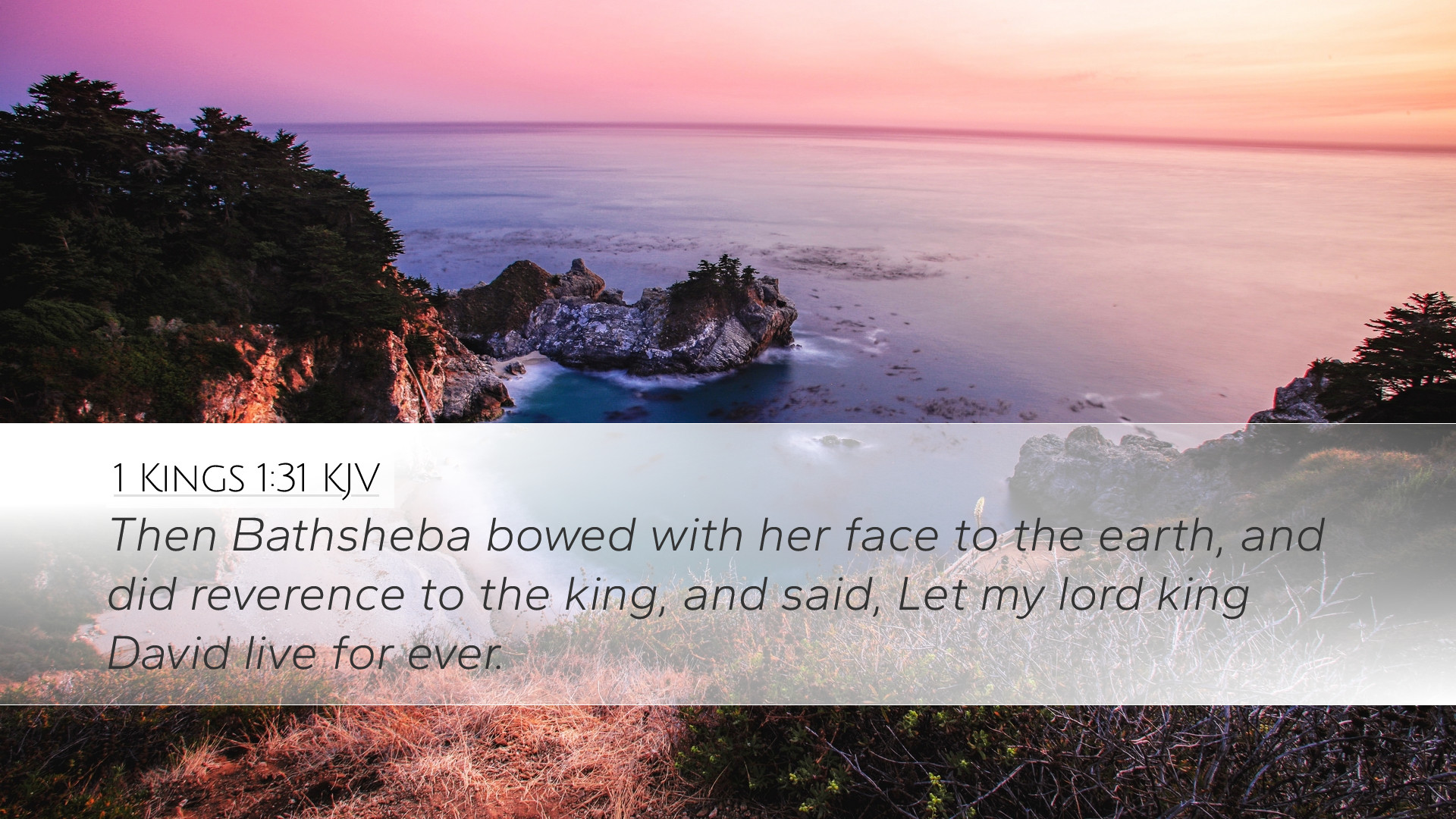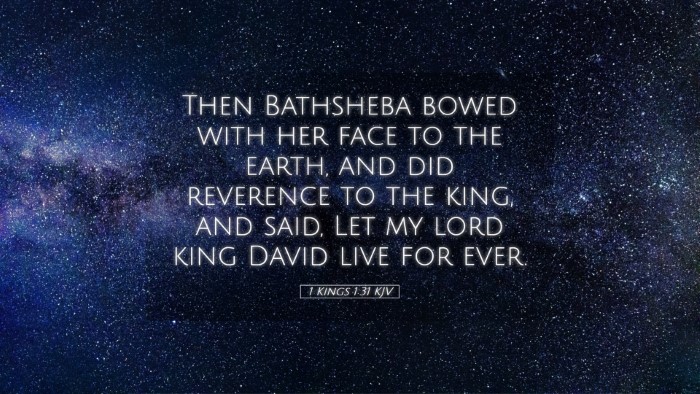Commentary on 1 Kings 1:31
In 1 Kings 1:31, we witness a pivotal moment in the narrative of Israel’s monarchy, where Bathsheba, the mother of Solomon, demonstrates her role in the fulfillment of God’s plan. This verse reads:
"Then Bathsheba bowed with her face to the ground and, kneeling before the king, she said, 'May my lord King David live forever!'"
Contextual Overview
This chapter occurs during a crucial transition from King David’s reign to that of his son Solomon. The historical and theological implications of this transition cannot be overstated. Surrounded by conflict and competing claims to the throne, Bathsheba’s actions serve as a reminder of the significance of divine choice and human agency in God's unfolding plan.
Insights from Public Domain Commentaries
Matthew Henry
Matthew Henry emphasizes the humility and reverence that Bathsheba displays in her address to David, highlighting her posture of bowing down. This act exemplifies her recognition of David’s authority as king and of the Lord’s sovereignty over the kingdom of Israel. Henry notes that Bathsheba's greeting, “May my lord King David live forever,” is a reflection of her hope and respect for her husband, as well as an expression of the well-being she wishes for him and the kingdom. This phrase encapsulates the reverence due to a reigning monarch, acknowledging both the king's present power and a prayer for his longevity.
Albert Barnes
According to Albert Barnes, Bathsheba’s declaration conveys not merely a surface layer of respect but an underlying theological assertion concerning the continuity of the Davidic line. Barnes points out that her posture—kneeling before the king—signifies not only submission but an appeal for favor in a time of political turmoil. He explains that Bathsheba’s actions are a blend of human hope intertwined with the divine promise made to David regarding his descendants. Her claim for Solomon’s rightful position is implicitly woven into her greeting, suggesting her role as an intercessor at a decisive moment for the future of the kingdom.
Adam Clarke
Adam Clarke highlights the emotional weight of Bathsheba's exclamation and its implications for leadership succession. He observes that her reverence and the use of the term “king” reflect a blend of personal loyalty and political necessity. Clarke suggests that this moment is filled with emotional tension, emphasizing how Bathsheba, despite her vulnerable position, was cognizant of the political maneuverings surrounding the ascension to power. This shows her as a pivotal figure who understands both the personal and public dimensions of kingship.
Theological Implications
The moment captured in 1 Kings 1:31 raises essential theological themes, including divine selection, human agency, and the nature of kingship. The relationship between Bathsheba and David embodies a larger narrative concerning the kingdom of God, leadership, and the fulfillment of divine promises. Each commentator underscores that Bathsheba’s actions were not merely personal but were deeply rooted in the unfolding covenantal history between God and Israel.
Divine Sovereignty and Human Responsibility
In examining Bathsheba’s role, we see a profound interplay between divine sovereignty and human responsibility. The commentators highlight that while God’s promises concerning Solomon are clear, the fulfillment requires human action and acknowledgment of divine order. Bathsheba’s act of honor and supplication signifies her understanding of this duality. It invites readers to reflect on their roles in divine plans, encouraging a posture of humility and earnestness before God.
Legacy of the Davidic Line
Furthermore, Bathsheba’s declaration serves as an affirmation of the Davidic line's legitimacy. The phrase “May my lord King David live forever” carries with it messianic implications, as the lineage of David leads to Jesus Christ. The commentators invite scholars and theologians to consider how this small yet potent moment sets the stage for the larger narrative of redemption in Scripture.
Practical Applications
For pastors, students, and theologians, the verse offers several practical applications:
- Understanding Authority: The posture of Bathsheba encourages a reflection on authority figures within one’s own context, challenging readers to approach leadership with respect and humility.
- The Role of Women: Bathsheba’s proactive engagement in political matters serves as a reminder of the significant roles that women have played throughout biblical history, urging contemporary churches to recognize and empower women in leadership.
- Prayer and Intercession: Her kneeling signifies the importance of prayer and intercession, inviting believers to seek divine favor in their circumstances, particularly in leadership transitions.
- Covenantal Faithfulness: For theologians, this moment illustrates the faithfulness of God to His covenant and encourages reflection on the unbroken line of divine promise that runs throughout Scripture.
Conclusion
In conclusion, 1 Kings 1:31 is a richly layered passage that encapsulates themes of faith, leadership, honor, and divine promise. Through the lenses of Matthew Henry, Albert Barnes, and Adam Clarke, we gain a multifaceted understanding of Bathsheba's actions and their implications for Israel and the broader biblical narrative. As we reflect on this moment, we are reminded of the sovereignty of God intertwined with human actions, leading us towards the ultimate fulfillment found in Christ.


